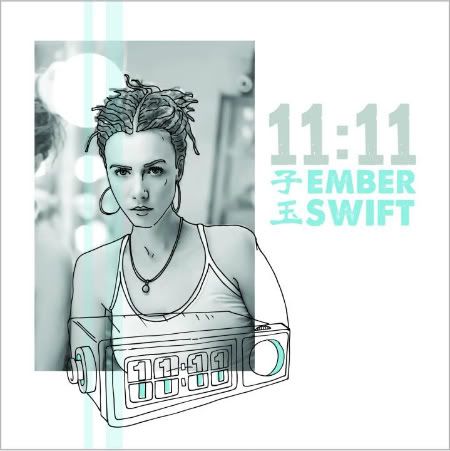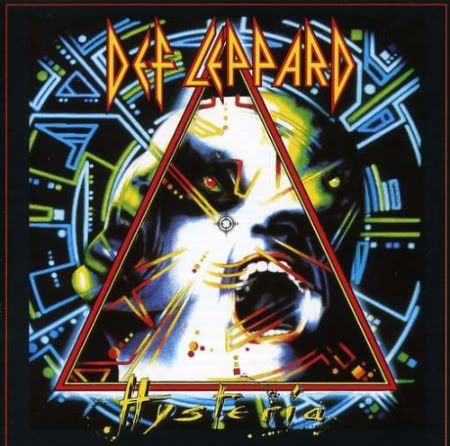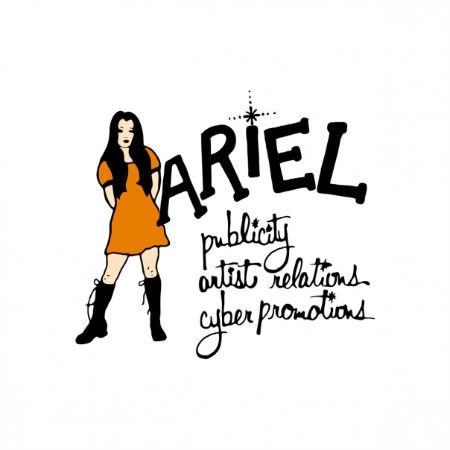
She's released ten CDs with her eleventh just around the corner and sold almost 60,000 units independently. She's toured all around the world playing thousands of shows in numerous countries and has been running her own independent record label Few'll Ignite Sound all the while. The truth is, I'm barely scratching the surface here, believe me, I could go on and on about all she's done during the course of her career, but then this blog/interview would become a book.
Before we begin though, I'd like everyone in and around the Toronto area to know that she's going to be performing at Hugh's Room (2261 Dundas Street West) in support of her new album on September 14, 2011. Come out and enjoy the show with me, it'll be a great one!
And now... on with the interview. :)

Dr Sean: You’ve been working really hard at your music career for almost two decades now. What is it about writing and performing music all over the world that keeps you going on your journey?
Ember: Well, I suppose in 2016, I’ll officially be at two decades ;-) I did start playing live as a teenager on the Ottawa scene in 1993, but didn’t release my first record until 1996. Still, I guess it’s been awhile, hasn’t it? Reading “almost two decades” made me sit back in my chair there for a second!
What keeps me going? I love writing songs. They’re the ultimate artistic riddle. It’s such a joyful challenge to bring melody and meter and rhythm and lyrics (etc.) together to create a unique concoction of sound that will hopefully move people when they hear it. I’ve always been passionate about the craft of songwriting and always want to improve. It’s a lifetime pursuit.
I also love performing. I love bringing songs and ideas into new geographies and I think I have the extensive travel throughout my life to thank for bringing me so much diversity of knowledge about the world. I feel really grateful for the opportunities music has given me. I also count many people I have met through touring as some of my best friends in the world.
So, what keeps me going? The joy of it all, really. There’s no other reason to do anything unless it brings joy, I say!
Dr Sean: When you set out to do this album, you sought financial assistance from your fans, peers and anyone else who was willing to contribute to its creation. Where did the donation idea come from and how did things go for you?
Ember: The industry has changed so dramatically over the past five years and now record sales are not really relevant to an artist’s ability or inability to survive in the industry. Without knowing that your album will be received by open ears, there’s no guarantees anymore that an artist will not suffer more doubt and wasted resources by creating a physical copy of their new songs in CD form. This kind of business risk is no longer a smart one for an independent artist like myself who is doing less touring but taking more international flights!
I decided that after ten albums and a solid following over the years that consists of really loyal and wonderful supporters, that I could ask them if they’d be willing to pre-purchase the new album. If they were, I could then rely on the community of supporters to bring the project to fruition and I could deliver it with a lighter financial burdern. It’s a new concept called “Fan-Funding” and many artists are turning to it these days. The response was overwhelming.
This fan-funded project, to me, is like community-supported agriculture. The supporters are supporting the art-maker (in this case, me) and then they reap the harvest of ‘song seeds’ that grow and bloom into a recording. In exchange, they get bonuses for their “Ambassador” status and it creates a sustainability model that keeps the artist (or song farmer!) alive.
Dr Sean: This is the 11th album of your career. Is there anything that you’d say is unique about this record compared to your previous releases?
Ember: It’s my 11th album that will be released in 2011. I feel it has a degree of auspiciousness about it, so the official release month is November. I have been making music for many years and there’s something about reaching the 11th project that feels like a pinnacle of sorts.
It’s also been a labour of language love. There are two linguistic releases: Mandarin (Chinese) and English. I’ve created a product that can be sold both separately and in the “box set” form, almost like old LPs had a side A and a side B. Most of the songs have their “twin” language versions with a few exceptions on each side. I’ve wanted to create and release this sort of project ever since I came to China and I feel really proud of finally accomplishing it!
Dr Sean: During the making of this album there were a couple unexpected challenges that came along the way. Can you tell us a little about that?
Ember: The project has taken a few turns with production crew. I imagined that my Montreal-based producer Tim Rideout, who was the producer on my 2009 release “Lentic”, would produce it. Tim, however, had to pull out of the project for personal reasons. I then turned to a production team here in Beijing. For mysterious (and culturally cloudly) reasons, they also pulled out. In the end, I went back to my roots in all ways (not just musically) and self-produced this record. After working with producers for my 2006 and my 2009 album, I had almost forgotten that I had the skills to self-produce a record. At this point, happy with the album results, I’m almost grateful for all of the production confusion! It restored a bit of self-confidence that I hadn’t realized I’d lost!
Dr Sean: For those who may not know, you're currently living in Beijing, China. How long have you been living there and how did it all come about?
Ember: Well, the shortened version is that I had always wanted to come to China and thought of it as my “dream destination.” I have a degree in East Asian Studies from UofT and assumed it would be my destination after my music career had fizzled out. In spring 2007, I was exhausted from touring at a hectic pace of @200 shows per year and I made the decision to “live the dream” rather than having it tucked away for “later.” I then booked a three-month journey to Beijing as a break, a vacation, and a retreat. My career hadn’t fizzled out, but I was afraid that I soon would if I didn’t do something for my spirit.
I wasn’t prepared for the love affair that I would fall into for China and Chinese culture, as a whole. I was so taken with the experience that I returned again for two months in late 2007, at which point I met my current partner who is also a musician here in China. When we fell in love, I knew that I had some sort of destiny to pursue in Beijing. I resolved to keep my heart open. After several more repeat visits, I moved here in late 2008 (part-time, that is, considering I still tour overseas). While I still retain my official status as a Canadian residet, living here has been a true adventure.
Dr Sean: How has this cultural shift affected your music and lyrics?
Ember: I’ve learned a lot about myself through this experience, on the whole, which has opened me up to a lot of different styles of music and artist expression. Learning a new language (Mandarin) has also influenced my ears and my tonal awareness. The instrumentation of China fascinates me, too, and I have enjoyed working with musicians who play traditional instruments here. All in all, immersing in a new culture is bound to have an impact on what we write about and how we express ourselves, musically and lyrically. I think I’ve only just begun to explore what those influences are.
Dr Sean: As I understand it, on this new album you've gone back to a more signature 'Ember Swift' sound whereas on your last release, “Lentic”, you experimented with some programming and synth sounds. What prompted you to experiment on “Lentic” and subsequently to come back to your roots with “11:11?”
Ember: “Lentic” was a departure record. I wanted to walk a new style path that was in-line with walking a new life path here in China. I really enjoyed the “folktronica” exploration that “Lentic” provided and it was a joy to write all the parts and build songs from just raw ideas into sonic landscapes, all with the help of a computer. I had always wanted to do this and I was thrilled to have the break from my touring career as well as the new surroundings of Beijing in which to explore in this way, musically.
That being said, sometimes departures lead us home.
“11:11” represents the founding of a new band (in Beijing) and the development of a sound in the way that I have always done it throughout my career—with great players and repeated live performance. I wrote and tested the songs on audiences and enjoyed the challenge of having to communicate in both languages (lyrically and through on-stage banter) depending on what side of the globe I was performing on. It became a lot like my pre-“Lentic” typical swirl of different styles and messages and humour.
In a way “11:11” is a homecoming, of sorts, where I have discovered that the core of what I am as a musician and a songwriter really hasn’t changed no matter how much my life and environment has.
Dr Sean: Tell us about the musicians who performed on this new record. Who are they and will they be touring with you as well?
Ember: The band won’t be touring with me in North America this time, sadly. They are Zac Courtney on drums (from Australia), Paplus Ntahombaye on bass (from Burundi, Africa) and Wang Ya Qi on erhu (from China). I’m on guitar and voice. Together, we represent four countries and we all live here in Beijing—a city that is incredibly diverse and home to people from all over the world.

Dr Sean: How many tour dates do have scheduled currently?
Ember: There are 24 dates in North America and there’s one big release show here in Beijing on the 2nd of September.
Dr Sean: Again, for those who may not already know, you're expecting your first baby very soon. How are you balancing this huge event with everything else that comes along with supporting a new release?
Ember: Yes, I’m so excited!! In a way, I’m expecting two babies this year: my new album and our new family member! I’m not sure how I’m balancing the two “projects” to tell you the truth, because pregnancy is truly a full-time project! But, I do know that I am ready to move into a new phase of Motherhood in my life and it is something that I have wanted for as long as I can remember. People often say, with almost a warning tone, “Your life is going to change forever, you know. After the baby, it will never be as it was.” My response is, “Bring it on! What makes you think I wanted it to stay the same?”
Dr Sean: I'm wishing you all the best with your new album, the tour and the newest addition to your family! Is there anything you'd like to say in closing?
Ember: Thank you so much, Sean.
I suppose the only thing that I might add is that I am returning to North America to spread these songs that represent a cross-cultural communication, a new global reality, a convergence with East and West (etc) and, in so doing, I am often confronted with the misconceptions that many Westerners have about what is truly happening in China. I know the media and political propaganda is to blame, for the most part, but as a result, I now continue to return to North America with even more fervor and conviction that music can make a difference in how people live their lives and see the world. I feel a sense of responsibility to deliver “witnessed truth,” or, shall we say, a less concocted perception through a glimpse into the realities that I have seen. I come with stories about people. Real lives. Real life.
As an activist and an artist—one who has combined my activism with my art for many years—I am often challenged by my fans as to how I can live in a country that has such a terrible human rights record, for instance, or live in a city that is struggling with such considerable air pollution. My response is that I am living in a place in progress, an imperfect world, in which there is so much in the way of cultural richness and pure humanity that I am convinced progress on all levels—not just in the building of highways, but in terms of quality of life and social infrastructure—will continue in China at a rate that no one can predict. Being a witness to a culture in high-speed transition and development, as an outsider, is a privileged place to be in. I’m an onlooker at a time of great historical change.
I’m returning with my new album “11:11” that contains songs about topics such as water conservation in urban settings, anarchy and youth, empowerment to women (and all those struggling for self-realization), cultural acceptance and diversity, and the greatest activist message of all: love. Because, after all, our capacity to love is the greatest power we have as human beings. Perhaps after coming to one of my concerts, people will walk away thinking differently about a country on the other side of the world, questioning the hype, and keeping their hearts open.

